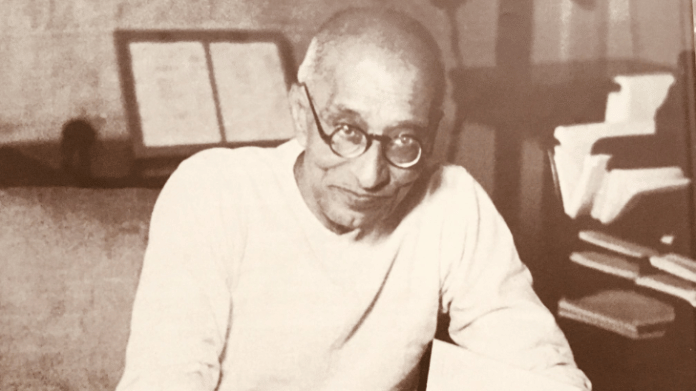New Delhi: Chakravarti Rajagopalachari, popularly known as Rajaji, was independent India’s first Indian Governor General. He was also the last one.
A member of the Indian National Congress during the pre-Independence era and a loyalist to Mahatma Gandhi, Rajagopalachari was a towering personality in the modern Indian politics.
Here’s a look back at his life.
Freedom struggle and Gandhi
Born on 10 December 1878, to Chakravarti Venkatarya Iyengar and Singaramma Iyengar in the British presidency of Madras, Rajagopalchari completed his law education from Presidency College.
During the time when he was practicing law in Salem, Rajagopalchari came to know about a lawyer who was professing ideas of civil disobedience in South Africa — Mahatma Gandhi. In 1913, Rajagopalachari printed Gandhi’s jail experience onto pamphlets at his own expense.
In his book Environmentalism: A Global History, historian Ramachandra Guha wrote that after Gandhi’s return to India in 1915, Rajagopalachari “followed Gandhi’s activities with fascination”.
It was in 1919 that Rajagopalachari met Gandhi for the first time in Madras (now Chennai). He participated in Gandhi’s Non-Cooperation Movement. He was also jailed for two years in Vellore in 1920.
After his release, he opened his own ashram to promote Gandhi’s principles of Hindu-Muslim harmony and the abolition of untouchability. He was also a proponent of khadi.
When Gandhi led the Dandi March to break the salt law in 1930, Rajagopalachari carried out a similar march at Vedaranyam in the Madras Presidency. He also became the editor of Gandhi’s newspaper, Young India.
Rajagopalachari was an ardent Gandhi supporter, but he never feared expressing his views. During the Quit India Movement, Rajagopalachari even opposed Gandhi. He was of the view that the British are going to leave the country eventually, so launching another Satyagraha was not a good decision. He was also in favour of a dialogue to put an end to differences between Hindu and Muslims.
Also read: Sri Aurobindo, a staunch nationalist who turned into a philosopher
Political career
His political career started to shape he was elected as the first premier of the Madras Presidency in 1937.
In 1939, Rajagopalachari took a step to abolish untouchability and caste prejudice and issued the Madras Temple Entry Authorisation and Indemnity Act. Under this Act, Dalits were allowed to enter inside temples.
At the time of Partition, Rajagopalachari was appointed as the Governor of West Bengal.
In 1947, during the absence of Lord Mountbatten, the last British viceroy and independent India’s first Governor General, Rajagopalachari was temporarily chosen to hold the office.
In June 1948, as Mountbatten was set to leave India, Rajagopalachari was given the position which he held till 26 January, 1950, when the Indian Constitution was enacted and the country became a republic.
Subsequently, he wanted to retire from politics, but Congress legislators forced him to take over as the chief minister of Madras in April 1952.
Also read: BR Ambedkar, the Congress critic who saw Gandhi and Patel as opposed to Dalits
After Independence
During his tenure as the chief minister of Madras, the precursor to the state of Tamil Nadu, Rajagopalachari actively participated in reforming the education system and bringing changes in the society. He also made Hindi a compulsory language in Tamil schools. His move led to protests against him, following which Rajagopalachari resigned as the CM.
He was a social conservative but advocated a free market economy. He wanted to reintroduce the Varna system into the society. And quite like Gandhi, he also believed in the significance of religion for the society.
Due to their contrasting ideologies, then Prime Minister Jawaharalal Nehru turned a bit bitter towards him later on. However, they remained friends. Rajagopalachari even wrote a gracious obituary for Nehru in his own magazine Swarajya.
In 1955, Rajagopalachari was honoured with India’s highest civilian award Bharat Ratna.
He died on 25 December, 1972.







On the Nagpur All India meeting of NSUI, Indiraji told the students that they should go to their own place and tell what havoc is caused by the RSS.Infact,the steel and plastic plates kept to serve food for students were thrown high in the air by miscreants and everyone started running thinking that the flying plates will fall on them.Indiraji blamed it on RSS
The first Governor General of India was: